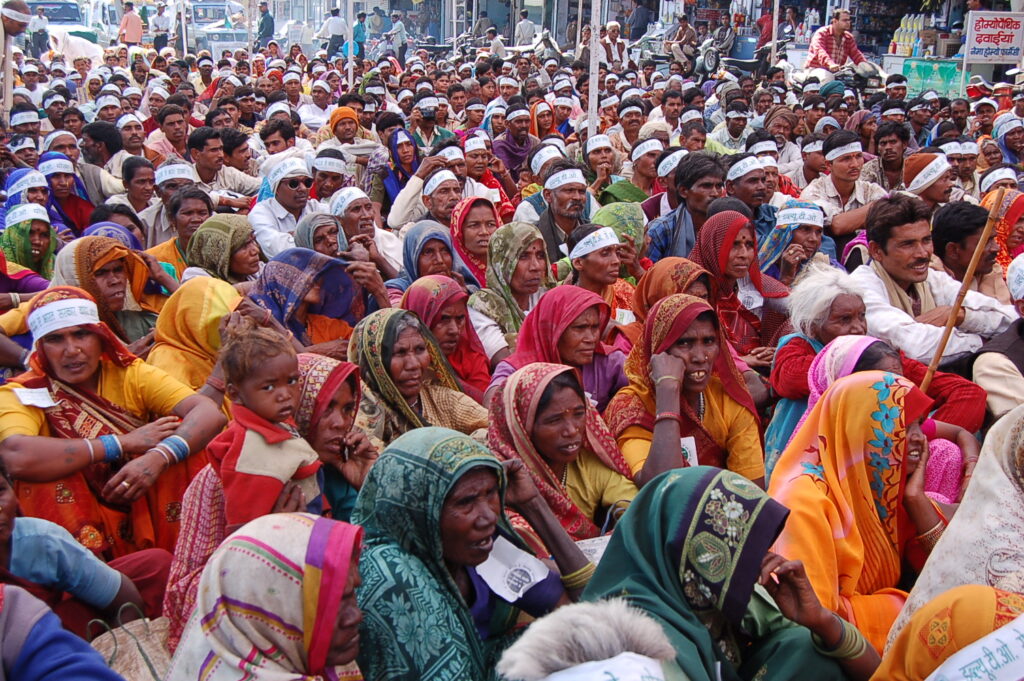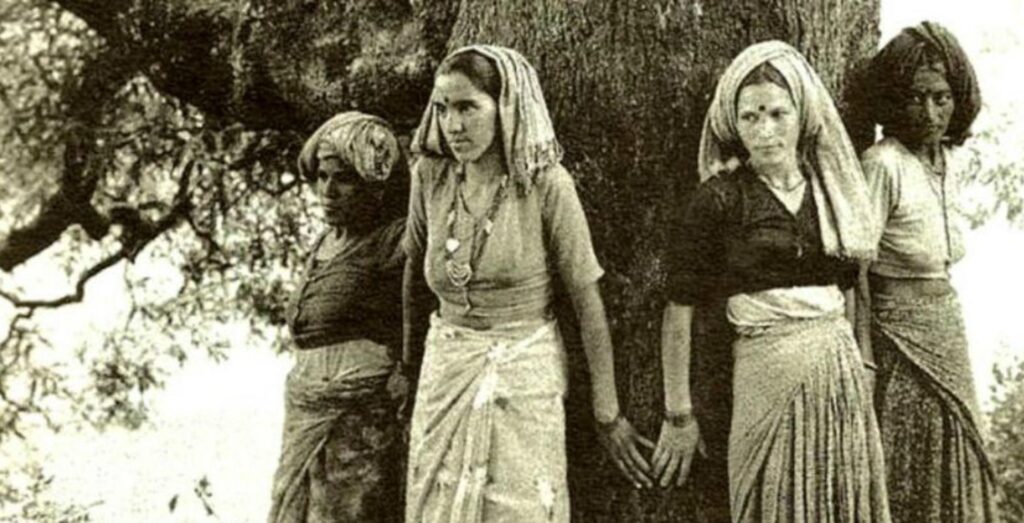“Empowering Women, Transforming India!”
Introduction: India’s journey since gaining independence in 1947 has been marked by significant societal transformations, and women have played a pivotal role in shaping the nation’s progress. From the early years of nation-building to the turn of the millennium, women have made notable contributions across various domains, challenging traditional norms and advocating for social change. In this blog, we will explore the contribution of women in transforming India from 1947 to till today highlighting key events, achievements, and the impact they had on society.
 1.Women in Politics and Governance
1.Women in Politics and Governance
(i) Leading in the Independence Movement : Women played a crucial role in India’s struggle for independence, actively participating in the freedom movement alongside men.
Prominent figures like Sarojini Naidu, Vijaya Lakshmi Pandit, and Aruna Asaf Ali emerged as inspirational leaders, championing the cause of freedom and equality.
(ii) Reservation for Women in Panchayati Raj Institutions : In 2001, the Indian government passed the 73rd Amendment Act, which mandated 33% reservation for women in local governing bodies, known as Panchayati Raj institutions.
This historic legislation provided women with a platform to actively participate in decision-making processes at the grassroots level and contribute to community development.
(iii) Women in Parliament and State Assemblies : The decade saw an increase in the representation of women in the Indian Parliament and state assemblies.
The 2019 Lok Sabha elections witnessed a record-breaking number of women elected as Members of Parliament, signaling a shift towards greater gender equality in the political sphere.
(iv) Enacting Progressive Legislation : In the early years after independence, the Indian government passed several progressive legislations addressing women’s rights and social issues.
The Hindu Succession Act of 1956 granted equal inheritance rights to women, challenging centuries-old gender biases in property rights.
(v) Rise of Women Political Leaders : The first decade of the 21st century witnessed the rise of several prominent women political leaders in India.
Sonia Gandhi, as the President of the Indian National Congress, played a crucial role in shaping the party’s agenda and political landscape.
Pratibha Patil became the first woman President of India in 2007, symbolizing the growing influence of women in the highest echelons of power.
(vi) Women’s Leadership in State Governments : Several states witnessed women taking on prominent leadership roles in government.
Leaders like Mamata Banerjee, Jayalalithaa, and Nirmala Sitharaman have made significant contributions to their respective states, driving policy reforms and shaping the development agenda.


- Women’s Empowerment and Social Reforms
(i) Promoting Women’s Education : Women’s education became a critical focus in the post-independence era, aiming to uplift women and enable their active participation in society.
Initiatives like the Kasturba Gandhi Balika Vidyalaya and the establishment of women’s colleges expanded educational opportunities for girls and women.
(ii) Advocating for Women’s Rights : women activists and organizations worked tirelessly to raise awareness about gender discrimination and fight for women’s rights.
The formation of the All India Women’s Conference in 1945 provided a platform for women to voice their concerns and advocate for social reforms.
(iii) Women’s Education and Literacy Programs : Several initiatives were launched during this period to promote women’s education and literacy.
The Sarva Shiksha Abhiyan (Education for All) program aimed at improving access to quality education for girls, bridging the gender gap in literacy rates.
(iv) Women’s Rights and Legal Reforms : The Protection of Women from Domestic Violence Act was passed in 2005, providing legal protection and support to women facing domestic violence.
The Pre-Conception and Pre-Natal Diagnostic Techniques (Prohibition of Sex Selection) Act was enacted to address the issue of female feticide and promote gender equality.



- Social Movements and Activism
(i) Women’s Role in Social Movements : Women actively participated in social movements addressing various societal issues.
The Chipko Movement led by women in the 1970s highlighted the importance of environmental conservation and sustainable development.
(ii) Empowering Marginalized Communities : Women from marginalized communities, such as Medha Patkar and Aruna Roy, fought for the rights of farmers, laborers, and tribal communities.
Their efforts led to the establishment of grassroots movements like the Narmada Bachao Andolan and the Mazdoor Kisan Shakti Sangathan.
(iii) Women’s Rights and Gender Equality : Women’s rights movements gained momentum, with increased awareness and advocacy efforts.
The #MeToo movement in India brought to light issues of sexual harassment and assault, fostering conversations around gender equality and the importance of creating safe and inclusive spaces.
(iv) Education and Skill Development : Initiatives were launched to promote education and skill development for women.
Programs like the Beti Bachao, Beti Padhao (Save the Girl Child, Educate the Girl Child) campaign aimed at improving access to education and enhancing opportunities for girls.



- Arts, Literature, and Cultural Influence
(i) Women’s Contributions in Literature and Arts : Women writers like Mahasweta Devi, Ismat Chughtai, and Amrita Pritam made significant contributions to Indian literature, challenging societal norms through their writings.
Female artists, such as Amrita Sher-Gil and Arpita Singh, brought a fresh perspective to Indian art, reflecting the evolving social landscape.
(ii) Women’s Representation in Cinema : Indian cinema saw the rise of influential female actors who portrayed strong and independent women on screen.
Icons like Nargis, Meena Kumari, and Shabana Azmi brought social issues to the forefront through their powerful performances.
- Economic Empowerment and Entrepreneurship
(i) Women in Corporate Leadership : The decade witnessed a notable increase in the number of women occupying leadership positions in the corporate sector.
Indra Nooyi served as the CEO of PepsiCo, becoming one of the most influential business leaders globally and inspiring a generation of women entrepreneurs.
(ii) Microfinance and Women’s Economic Empowerment : Microfinance institutions, such as SEWA (Self-Employed Women’s Association), provided financial services and support to women in rural areas, enabling them to start their own businesses and achieve economic independence.
(iii) Women-led Startups and Innovation : The decade witnessed a surge in women-led startups and entrepreneurial ventures across various sectors.
Women entrepreneurs brought fresh perspectives, innovative ideas, and disrupted traditional industries, contributing to economic growth and job creation.
(iv) Financial Inclusion and Women’s Empowerment : Financial inclusion initiatives focused on empowering women economically.
Programs like the Pradhan Mantri Mudra Yojana provided access to credit and financial resources to women entrepreneurs, enabling them to start and scale their businesses.



- Health and Well-being
(i) Maternal and Child Health : Efforts were made to improve maternal and child health outcomes in India.
Programs such as the Pradhan Mantri Surakshit Matritva Abhiyan focused on providing quality healthcare services to pregnant women, reducing maternal and infant mortality rates.
(ii) Mental Health Awareness : Mental health awareness and initiatives gained traction, focusing on the unique challenges faced by women.
Campaigns and support services aimed at breaking the stigma surrounding mental health and providing women with the necessary resources and support.
Conclusion : The period from 1947 to 2000 marked a significant chapter in the contribution of women in transforming India. Women emerged as powerful agents of change, challenging societal norms, and advocating for social progress. From politics and governance to education, social movements, and the arts, women made their presence felt in every sphere of society.
Women played a crucial role in India’s struggle for independence, standing shoulder to shoulder with men in the fight for freedom and equality. Post-independence, they continued their efforts by advocating for women’s rights, promoting education, and enacting progressive legislation. The Hindu Succession Act of 1956, which granted equal inheritance rights to women, shattered centuries-old gender biases and empowered women economically.
Social movements led by women, such as the Chipko Movement and movements for the rights of marginalized communities, demonstrated their commitment to social justice and environmental conservation. Women writers and artists, through their works, challenged societal norms, and brought issues of gender inequality and social discrimination to the forefront.
The contributions of women during this period laid the foundation for a more inclusive and equal society. Their resilience, determination, and unwavering commitment to social progress inspired generations and created pathways for future generations of women to thrive.
As we reflect on the transformation brought about by women in this period, it is crucial to acknowledge the challenges they faced and continue to face. Gender disparities, discrimination, and violence against women persist, highlighting the need for ongoing efforts to ensure true gender equality in all spheres of life.
Moving forward, it is essential to build upon the contributions of women and create an environment that supports and empowers them. By providing equal opportunities, ensuring access to education and healthcare, and eliminating gender-based discrimination, India can harness the full potential of its women, driving sustainable development and fostering a more equitable and prosperous nation.
As we celebrate the achievements of women in transforming India from 1947 to 2000, let us honor their legacy by continuing to work towards gender equality, amplifying women’s voices, and creating a society where every woman can thrive and contribute to the nation’s progress. Together, we can build a future where women’s contributions are fully recognized, valued, and celebrated, leading to a stronger and more inclusive India for all.
WRITER


